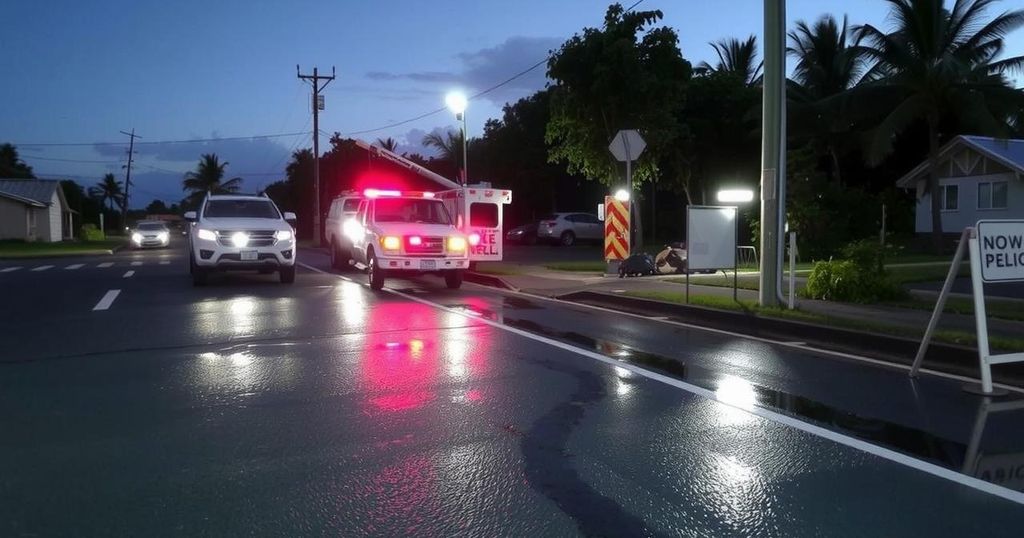Mayotte Declares Curfew as Cyclone Chido Leaves Devastation and Death
Mayotte has imposed a curfew following Tropical Cyclone Chido’s devastation, confirmed to have killed at least 22 people and injured over 1,400. Hundreds are feared dead as widespread destruction complicates aid efforts. Officials warn of potential health crises if timely assistance is not provided. President Macron plans to visit the territory, amidst political turmoil in France regarding the government’s response.
Authorities in Mayotte, a French archipelago located off the eastern coast of Africa, have imposed a curfew following the widespread devastation caused by Tropical Cyclone Chido, which struck the region over the weekend. The cyclone, with wind gusts reaching up to 124 miles per hour, has resulted in at least 22 confirmed fatalities and extensive damage across numerous neighborhoods. Officials express concerns that the death toll could potentially rise into the hundreds, primarily because many of the territory’s undocumented residents are unaccounted for in shanty towns that suffered severe destruction.
The curfew, which will be enforced from 10 p.m. to 4 a.m., is deemed necessary to facilitate the distribution of food and water to those affected. Despite minimal unrest reported, the government remains vigilant about the possibility of looting amidst the dire circumstances. President Emmanuel Macron plans to visit the afflicted territory in the coming days to assess the situation firsthand.
In a statement to RFI radio, Ambdilwahedou Soumaila, the mayor of the capital city Mamoudzou, reported over 1,400 injuries resulting from the storm’s impact. He highlighted the unprecedented nature of this cyclone for Mayotte, which is typically shielded by Madagascar from such storms, adding, “This natural phenomenon didn’t give our territory a chance.” Rescue efforts, however, have been hindered by inaccessibility to several hillside communities devastated by the storm.
Réunion, another French island located roughly 900 miles southeast of Mayotte, is currently serving as a logistical hub for relief operations. The French interior ministry has indicated that water supply restoration is expected shortly, and medical services are set to strengthen in the area with the arrival of a field hospital. However, local officials are concerned about potential health crises resulting from inadequate aid delivery and the delay in retrieving deceased individuals from the wreckage.
Authorities in Mayotte are also grappling with the complexities of illegal immigration from neighboring Comoros, with some undocumented residents reportedly failing to seek shelter in designated locations during the storm. This raises questions regarding the impact of fear surrounding immigration enforcement on residents’ safety measures. The timing of the disaster coincides with a period of political instability in France, following the recent reshuffling of Prime Minister François Bayrou’s cabinet in light of emergency discussions regarding the cyclone’s aftermath.
Tropical Cyclone Chido recently struck the French territory of Mayotte, causing significant destruction and loss of life. Mayotte is known for its precarious socio-economic conditions, with a substantial undocumented immigrant population. This disaster has not only left behind physical devastation but poses a serious risk of a health crisis as aid efforts are complicated by logistical challenges and political implications for the French government. The territory’s remote location and specific vulnerabilities, including substandard housing in shanty towns, exacerbate the situation.
The situation in Mayotte following Tropical Cyclone Chido is dire, with substantial loss of life, injuries, and critical infrastructure damage. The imposition of a curfew aims to facilitate urgent aid delivery. The complexities of illegal immigration and the current political climate in France further complicate the response efforts. Immediate action is needed to address the humanitarian crisis, restore order, and ensure that affected residents receive the necessary assistance without delay.
Original Source: www.nytimes.com




Post Comment